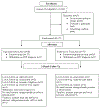Effect of Yoga on Antiretroviral Adherence Postincarceration in HIV+ Individuals
- PMID: 32089078
- PMCID: PMC7733694
- DOI: 10.1177/1078345819897924
Effect of Yoga on Antiretroviral Adherence Postincarceration in HIV+ Individuals
Abstract
The negative impacts of stress on antiretroviral therapy (ART) adherence and the many stressors faced by people returning from incarceration support the need for stress reduction interventions for this population. We hypothesized that 37 returning citizens living with HIV and substance use problems randomized to a 12-session weekly yoga intervention would experience improved ART adherence, lower viral loads, and lower heart rate and blood pressure as compared to 36 people randomized to treatment as usual (TAU). We found that ART adherence increased for yoga participants and decreased for TAU participants. There were no significant changes for viral load, heart rate, or blood pressure. The lack of statistically significant effects may be due to a small sample size and enrollment of people largely in HIV treatment. Studies with larger sample sizes and participants exhibiting low ART adherence are warranted to better understand yoga's impact.
Keywords: HIV; antiretroviral therapy adherence; reentry; substance use; yoga.
References
-
- Ammassari A, Trotta MP, Murri R, Castelli F, Narciso P, Noto P, … Antinori A (2002). Correlates and predictors of adherence to highly active antiretroviral therapy: Overview of published literature. Journal of Acquired Immune Deficiency Syndromes, 31, S123–S127. - PubMed
-
- Barai N, Monroe A, Lesko C, Lau B, Hutton H, Yang C, … Monroe A (2017). The association between changes in alcohol use and changes in antiretroviral therapy adherence and viral suppression among women living with HIV. AIDS and Behavior, 21(7), 1836–1845. 10.1007/s10461-016-1580-x - DOI - PMC - PubMed
Publication types
MeSH terms
Substances
Grants and funding
LinkOut - more resources
Full Text Sources
Medical


